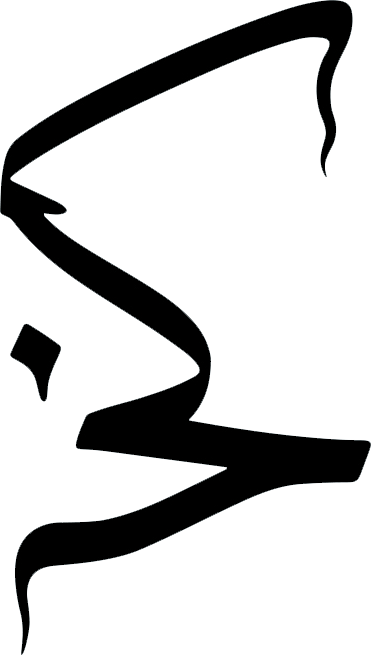No-Man’s Land
by Lina Fansa
Untitled, by Hana Kudsi , 1999. Courtesy of artist.
Well, I’m in no-man’s land, and without a man.
On the road to my parents’ house this time—Damascus, the obscure place of an older generation—and I’m taking the kids on a journey to 1960.
Cool Lebanese radio plays songs so dull and old that even the Prophet (PBUH) wouldn’t know the lyrics. “Rock Me Baby” has faded out into a bad signal and some jumbled words. The static reminder of ancient Syrian boredom begins to pop in an out of the atmosphere; a mosquitos’ electrocuting death sentence in a light zapper.
“We are now driving through no-man’s land,” I tell them.
“Is this where we’re going? Is that the name of this country?” the little one asks.
I explain to her that these lands belong to no one, and watch her puzzled face turn into a curious one as she floats back into her daydream. She’s young but if there’s anything she understands, it’s neutrality. Her ADD puts her back to sleep, oblivious to the sounds of the expired AC from 1983 wheezing like strong winds through a smoker’s lungs.
They must learn… It must be easier now, away from their Disney channel, Shakira albums, and French dolls. They’ll discover how it feels to walk on a street and be asked, “How are you?” by people who actually mean it. I can already see them frustratingly search the TV for English channels. They’ll be taught how to read books (including the Holy Book!) and think about the unseen, the dead. What it means to grow old in a generation that never had time to be a child.
Soon, they’ll discover the faded Dumbo elephant stickers on the bed. And I’ll tell them that I left Damascus after the day I was born. The house has not changed (or been cleaned) ever since. Their grandfather crossed this very same highway in reverse to go look for work after losing his job to nationalization measures in 1964. They’ll learn that, for the last six decades, these borders have been crossed and re-crossed with the strongest vitality and urge to live in a sort of musical peace. Same tones, different notes.
I’m dreaming of the sea, missing it with every piece of condensed humidity from the city that moves away from me. My hair is softer and my lips a little dustier, my accent has slowly changed back.
Our friendly taxi driver Abu Ahmad, whose heavy breathing seems to annoy my eldest, tells stories in his raspy voice about different ways to bribe officers at the border. He boasts that he is the man for the job—been doing it for years—since he knows everything there is to know about this border. He is, however, going to keep a look out for any new faces. According to Abu Ahmad, those ones are the “sons of mentally challenged donkeys” and he believes in “God’s will to wipe that sort of species off the face of the earth.”
They’re all the same, if he asks me...
I’m not afraid but my palms sweat lightly as we approach the check-point. I can already taste the aroma of photocopied ink. The uniformed guards are getting heavier, kneeling on one leg and licking their chubby fingers as they turn the pages of documents.
Pictures of the man now appear in no-man’s land. The kids bend their necks to get a better view of this imaginary border. There is nothing but primary colours, and crispy clean skies.
My heart beats deeper as I see more of the pictures. Man with family. Man with man. Man standing alone. We are just the three blind mice sitting here and watching, smart, but helpless little mice, caught on a superglue trap. Not alive nor dead, just stuck.
I flash them my stern look and they respond mockingly, since it’s almost identical to the expression on all the posters. The kids straighten up as I pull out the passports. They know this means business, because I represent them as I always have. Who else would, but a man? That’s what we are told over and over again.
My heart belongs to no-man’s land,
But the future is all in their hands.
I hope one day they’ll understand.
Lina Fansa migrated like birds / between different cultures / ‘United’ places and Saudi, to touch base with koussa ma7shi / in Beirut city. Got a visual degree from AUB to see / life a bit differently. Currently, / with a 9 to 5 job in the Khaleej, / in the music industry; as well as other fun cities / that are a little more free. Lina thinks the Middle East could use a little comedy, / even though her writing is mainly about heartbreaks and tragedy. One day she hopes, / but until then we will wait and see.

